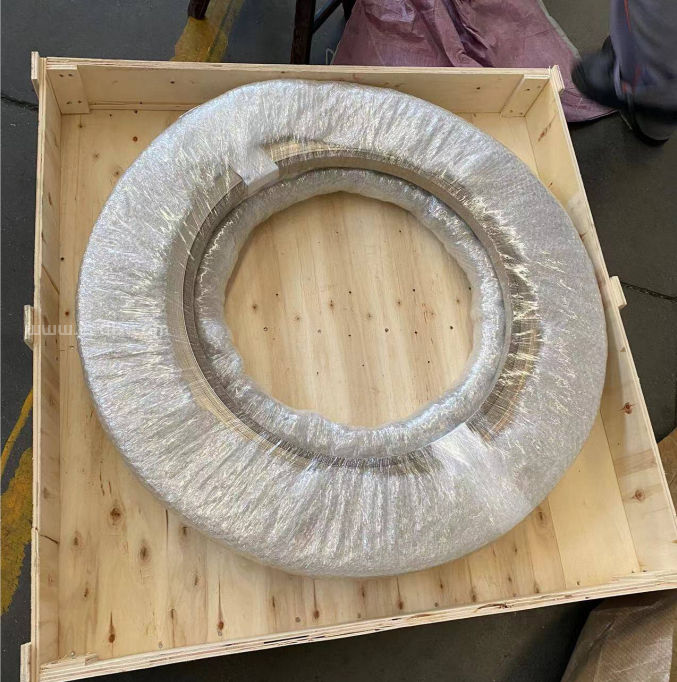Welcome to Changzhou DLX Alloy Co., Ltd.
Email:sales8@dlx-alloy.com Mobile/Whatsapp:+86 199 0611 9641
Specialized manufacturer of heaters, thermocouples and titanium,over 20 years.
Welcome to Changzhou DLX Alloy Co., Ltd.
Email:sales8@dlx-alloy.com Mobile/Whatsapp:+86 199 0611 9641
Specialized manufacturer of heaters, thermocouples and titanium,over 20 years.

Whatsapp:+86 199 0611 9641
Email:sales8@dlx-alloy.com
Add:NO.32 West Taihu Road, Xinbei District, Changzhou, Jiangsu,China
Inconel Strip
Product Details
Product Description
Inconel X750 strip is a flat, thin form of Inconel X750 alloy, which is a high-performance nickel-chromium-based superalloy known for its exceptional resistance to high temperatures, oxidation, and corrosion. Here are some key details about Inconel X750 strips:
Alloy Composition: Inconel X750 typically consists of around 70% nickel, 15-17% chromium, 5-9% iron, and small amounts of other elements like aluminum and titanium.
Temperature Resistance: The alloy can withstand temperatures up to approximately 1300°F (700°C) while maintaining its mechanical strength and integrity.
Corrosion Resistance: Excellent resistance to oxidation, carburization, and corrosion, making it suitable for harsh environments.
Inconel X750 wire is a kind of nickel-chromium alloys. Alloy X750 offers superior resistance to oxidation, corrosion, and scaling at elevated temperatures, which makes it ideal for use in these demanding conditions. It maintains its strength and stability even under thermal cycling, where materials are repeatedly heated and cooled. This ensures that fixtures made from Inconel X750 remain dimensionally stable and resistant to warping or degradation over time, leading to consistent, high-quality results in heat treatment processes. Furthermore, the wire form of Inconel X750 allows for the creation of complex fixture designs, providing flexibility for various industrial applications.
Chemical Component
| Model No. | Inconel X750 |
| Type | Nickel Alloy Wire |
| Density | 8.47 |
| Elongation | 2~5 |
| Technology | Cold Drawing |
| Melting Range | 1354-1413c |
| Tensile Strength | 1170-1520MPa |
| Yield Strength | 1035-1450MPa |
| Surface | Bright/Acid White/Oxidation |
| Transport Package | Carton or Wooden Box |
Manufacturing Engine Seals with Inconel X750 Strips
**1. Material Preparation:
Cutting: Inconel X750 strips are cut to the desired dimensions using precision cutting tools. The thickness and width of the strips are tailored to meet the specific requirements of the engine seals.
Forming: The strips are then formed into the required shape. This can be done through methods such as stamping, bending, or rolling, depending on the design and complexity of the seal.
**2. Machining:
Precision Machining: After forming, the strips may undergo precision machining to achieve exact dimensions and tolerances. This ensures that the seals fit perfectly into their designated locations within the engine.
**3. Heat Treatment:
Annealing: In some cases, heat treatment processes such as annealing are applied to relieve stresses and improve the material's ductility and machinability before the final shaping.
**4. Surface Treatment:
Coating: Depending on the application, additional surface treatments or coatings may be applied to enhance the seal’s performance and longevity.
**5. Quality Control:
Testing and Inspection: The finished engine seals are subjected to rigorous testing and inspection to ensure they meet industry standards and performance requirements.
**1. High-Temperature Resistance:
Thermal Stability: Inconel X750 maintains its mechanical properties at elevated temperatures, making it ideal for engine seals that are exposed to high heat in jet engines and gas turbines.
**2. Corrosion and Oxidation Resistance:
Durability: The alloy's resistance to oxidation and corrosion ensures that engine seals remain effective over time, even in harsh chemical environments and under constant exposure to high temperatures.
**3. Thermal Cycling Resistance:
Fatigue Resistance: Inconel X750 is highly resistant to thermal cycling, which involves repeated heating and cooling. This property helps prevent failure of the seals due to thermal stresses.
**4. Mechanical Strength:
Structural Integrity: The high tensile and yield strength of Inconel X750 provides robust performance under the mechanical stresses encountered in engine operation, maintaining the seal's integrity.
**5. Long Service Life:
Reliability: Due to its durability and resistance to wear and tear, Inconel X750 enhances the longevity and reliability of engine seals, reducing maintenance needs and extending the life of the engine components.
**6. Versatility:
Adaptability: Inconel X750 can be fabricated into various complex shapes and sizes, allowing for customization to fit specific engine designs and performance requirements.
In summary, Inconel X750 strips are well-suited for manufacturing engine seals due to their superior high-temperature and corrosion resistance, mechanical strength, and resistance to thermal cycling. These properties ensure reliable performance and durability in demanding aerospace applications.
Physical Properties
Density: 0.299 lb/in3, (8.28 g/cm3)
Modulus of Elasticity (E):
At 70°F (20°C): 31.0 x 106 psi (214 GPa)
At 1000°F (538°C): 26.7 x 106 psi (184 GPa)
Modulus of Rigidity (G):
At 70°F (20°C): 12.0 x 106 psi (82.7 GPa)
Coefficient of Expansion:
7.8 µin/in.-°F (70°F to 1000°F)
14.5 µm/m-°C (20°C to 538°C)
Electrical Resistivity: 20.1 µΩ.in, (122 µΩ.cm)
Thermal Conductivity: 83 Btu-in/ft2hr-°F, (12.0 W/m-K)
Applicable Specifications
Wire & Bar: AMS 5698, AMS 5699, AMS 5778, NACE MR0175 (ISO 15156-3), ASTM B637, AMS 5667, AMS 5668, AMS 5670
Typical Mechanical Properties – Spring Applications
1 Annealed
Heat Treatment: 2000 – 2200°F (1093 – 1204°C)
Tensile Strength:130 ksi max; (896 MPa) max
2 No.1 Temper
Heat Treatment: As supplied condition.
Tensile Strength: 130 – 165 ksi; (896 – 1138 MPa)
3 No.1 Temper + Aged
Heat Treatment: After spring coiling. Age: 1350°F (732°C) for 16 hours.
Tensile Strength: 165 – 220 ksi (1138 – 1517 MPa)
Suggested Operating Conditions: Optimum resistance to relaxation at temperatures up to 1000°F (538°C) with moderate or low stresses.
4 Spring Temper
Heat Treatment: As supplied condition.
Tensile Strength: 160 – 220 ksi; (1103 – 1517 MPa)
5 Spring Temper + Aged
Heat Treatment: After spring coiling. Age: 1200°F (649°C) for 4 hours.
Tensile Strength: 180 – 250 ksi; (1241-1793 MPa)
Suggested Operating Conditions: Optimum stress and low relaxation at temperatures up to 700°F (371°C)
6 Spring Temper + Solution + Aged (3 Step Heat treatment)
Heat Treatment: After spring coiling. Solution Heat Treat: 2100°F (1149°C) for 2 hours and air cool. Age Harden at 1550°F (843°C) for 24 hours and air cool. Reheat to 1300°F(704°C) for 20 hours and air cool.
Tensile Strength: 145 – 190 ksi; (1000-1310 MPa)
Suggested Operating Conditions: Optimum resistance to relaxation at temperatures in the range 1000 – 1300°F (538 – 704°C).
Packaging&Shipping

Company Profile
About CHANGZHOU DLX ALLOY CO., LTD
Founded in 2002, CHANGZHOU DLX ALLOY CO., LTD is a leading manufacturer specializing in the research and production of specialized alloy materials. Our factory has earned both the ISO9001 International Quality Management System Certificate and SGS Certification, affirming our commitment to high standards of quality.
We are experts in the entire alloy production process, including melting, drawing, heat treatment, finishing, and rigorous testing. Our product range includes nickel-based, copper-based, and iron-based alloys, such as super alloys, welding materials, anti-corrosion alloys, precision alloys, FeCrAl alloys, NiCr alloys, CuNi alloys, and thermocouples. These are available in various forms including wire, strip, ribbon, bar, tube, and plate.
Previous article:Maximize Efficiency and Durability withInconel Strip for Industrial
Next article:Weldable Inconel 625 Strip for Custom Fabrications